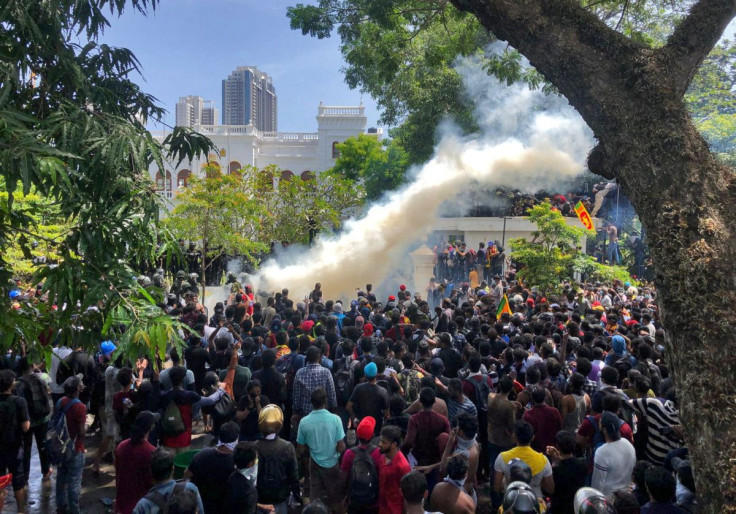Sri Lankans Storm Prime Minister's Office, Demanding He Quit As Well

Barely hours after Sri Lankan President Gotabaya Rajapaksa fled the country on Wednesday, hundreds of people were demanding the resignation of the prime minister as well and fighting street battles with security forces, some armed with assault rifles.
"Ranil go home!" they chanted before storming the office of Prime Minister Ranil Wickremesinghe in Colombo. Wickremesinghe's whereabouts could not be immediately confirmed by Reuters.
Police fired repeated rounds of tear gas and Wickremesinghe, acting as the president in Rajapaksa's absence, said in a video statement he was working to declare a nationwide emergency.
The protesters see him as an ally of Rajapaksa and want him out.
"We want Ranil to step down," said S. Shashidharan, a 30-year-old who said he was tear gassed outside the prime minister's office earlier in the day.
"Arrest all those who helped Gota (the president) to escape. We want our stolen money back."
The prime minister's office is a whitewashed colonial-era building, with an ornate wooden staircase connecting its two floors, and a lawn outside.
The site was jammed with protesters, who had battled with the security forces for some three hours and finally broke through the compound's large black gates around 2 p.m.
In a courtyard, a group of peaceful protesters gathered to sing revolutionary Sinhala songs, while armed military personnel sat inside an airconditioned room nearby.
Other armed security personnel ushered protesters through an airy room on the floor above, where Reuters had interviewed Wickremesinghe in late May.
The plush furniture had been pushed to the corners and access to Wickremesinghe's main office, adjoining the staircase, was blocked.
'MOMENTOUS DAY'
A few kilometres (miles) away hundreds of people had queued peacefully to tour Gotabaya's official residence.
K.K. Subasinghe was one of those in the line waiting to go into the home of the once-feared former soldier, who boarded a Sri Lankan air force aircraft and fled to the Maldives early on Wednesday morning, accompanied by his wife and two bodyguards.
After massive protests against his rule on July 9, Rajapaksa told the speaker of parliament that he would step down.
Subasinghe said he too served in the Sri Lankan army, fighting in the country's bloody civil war against Tamil Tiger guerrillas. The war ended in 2009, under the direction of Rajapaksa, then the defence secretary.
But Subasinghe said he had little admiration for Rajapaksa, and had brought his family and brother along to show them the opulence of the presidential residence.
"I wanted to give them a glimpse of their (the Rajapaksas') luxurious lifestyle," Subasinghe said, dressed in a collared t-shirt and khaki pants, holding a green plastic bag.
"While we were suffering, they asked us to grow our own food and ride on cycles."
Subasinghe said he expected massive celebrations if Rajapaksa resigned, although there was still some trepidation among others in the queue that he would actually quit.
"We'll celebrate this momentous day," he said. "I think that the protest will become stronger than July 9 if he doesn't resign."
The crowds circled the gardens of the colonial-era building, where some napped in the grass and others took selfies on their mobile phones.
Volunteers guided groups past the president's swimming pool. A lone young man was in the murky grey waters as they passed by.
Inside the main building, Subasinghe and his family could only access a small portion of the ground floor. The rest, including the bedroom and large halls, had been roped off by protest organisers.
Next to an adjoining building, a BMW 7 series luxury sedan stood parked, its fuel cap pried open.
"I never expected this sort of luxury," said Subasinghe's elder brother, M.D. Chandradasa, as they finished their tour of the residence.
"It's okay if you're the head of state but what about us poor people?"
© Copyright Thomson Reuters 2024. All rights reserved.







